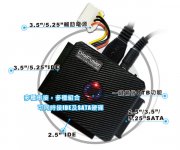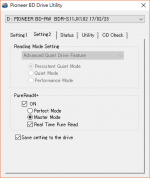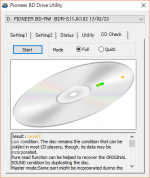I haven't used a proper CD player since I've had a laptop computer, now realizing I haven't had a CD player in a laptop for 5 years now. Not sure how many CD's we own, 200, maybe 500? They are old, not SACD. I listen in two channel stereo. My system has become much more revealing over the last couple of years, source matters.
I would like FLAC files, high grade, don't have a separate DAC yet.
Not sure what software, additional hardware I would be using on a MacBook Pro, or build a Linux based desktop only for the task of making high quality copies.
I was about to post on beginning a project for modifying a CD player such as a Marantz CD63 with mods, separate PSU's, anything that doesn't require SMD soldering. Through hole, fine. Sockets for op-amps? I don't really want to own the CD player after making the copies.
I want metadata, even if the older players don't read it, a two step process to add it?
Other searches come up with results that with brand x software it doesn't matter if the player itself is quality or not. I'm calling BS on that, but admit I have no idea what I'm talking about either. I've decided to ask the question here.
Cheers,
Jeff
I would like FLAC files, high grade, don't have a separate DAC yet.
Not sure what software, additional hardware I would be using on a MacBook Pro, or build a Linux based desktop only for the task of making high quality copies.
I was about to post on beginning a project for modifying a CD player such as a Marantz CD63 with mods, separate PSU's, anything that doesn't require SMD soldering. Through hole, fine. Sockets for op-amps? I don't really want to own the CD player after making the copies.
I want metadata, even if the older players don't read it, a two step process to add it?
Other searches come up with results that with brand x software it doesn't matter if the player itself is quality or not. I'm calling BS on that, but admit I have no idea what I'm talking about either. I've decided to ask the question here.
Cheers,
Jeff
Red Book CDs have data stored in blocks and verification numbers stored in separate. When you rip the contents of an audio CD it is important that the software applies the algorithm to the data retrieved and compares the result to the verification number stored. If they match, the data was extracted from the CD correctly.
As an added verification step there is AccurateRip software and database. The software applies a checksum to each track extracted and compares to the contents of the database, if available. At the end of the extraction process it reports on the number of matches found in the database, which means, how many different users extracted data from a similar CD and obtained the same results. That adds to the confidence that the data extracted is correct.
For Windows there is Exact Audio Copy and CUETools software, both of which support AccurateRip and obtain metadata from FreeDB. Whatever platform you are using, look for software that supports both.
As an added verification step there is AccurateRip software and database. The software applies a checksum to each track extracted and compares to the contents of the database, if available. At the end of the extraction process it reports on the number of matches found in the database, which means, how many different users extracted data from a similar CD and obtained the same results. That adds to the confidence that the data extracted is correct.
For Windows there is Exact Audio Copy and CUETools software, both of which support AccurateRip and obtain metadata from FreeDB. Whatever platform you are using, look for software that supports both.
I haven't done this in a while so maybe there are better alternatives but I used to use EAC (Exact Audio Copy) to rip disks to hard drive then FlacFrontend to convert to flac. Can't remember if metadata is transferred, sorry.
Here is a link concerning EAC and Flac
EAC and FLAC - Hydrogenaudio Knowledgebase
Here is a link concerning EAC and Flac
EAC and FLAC - Hydrogenaudio Knowledgebase
Last edited:
It depends on how you setup EAC. Sorry to tell you but you did not do it properly, as EAC can extract directly to FLAC and, as mentioned above, can retrieve metadata from FreeDB or any other database you instruct it to use.
I speak from personal experience having extracted a very large number of CDs I own.
I speak from personal experience having extracted a very large number of CDs I own.
Thanks for the tips, does this suggest there is no value in investing in the best CD player possible for ripping? A 10 year old workstation with a Xeon processor, with a DVD writer produces the same results as an "audiophile" grade CD player?
All of the mods made to a CD player, starting with capacitors, different op-amps, alternate power supplies, disabling headphone section, on and on are only for making subjective changes to direct listening to CD's? (as opposed to making a copy to listen to later)
Excuse my ignorance.
All of the mods made to a CD player, starting with capacitors, different op-amps, alternate power supplies, disabling headphone section, on and on are only for making subjective changes to direct listening to CD's? (as opposed to making a copy to listen to later)
Excuse my ignorance.
The ripping is a purely digital process, a matter of getting the correct 0 and 1 strings off the disc into the PC. And programs like EAC do that perfectly, if there is a dropped bit, they repeat until they get that section right.
It is overkill because even if they miss a bit, there's enough redundancy in the error correction system to restore the missed bit, but as they say, use belt and suspenders ;-)
I have my entire collection in lossless FLAC, courtesy EAC.
Jan
It is overkill because even if they miss a bit, there's enough redundancy in the error correction system to restore the missed bit, but as they say, use belt and suspenders ;-)
I have my entire collection in lossless FLAC, courtesy EAC.
Jan
It is conceivable that some of the changes people make to CD players for direct listening have no effect either. For ripping you just need the bits, and you will either get them perfectly or not at all. That is what modern engineering delivers.
Jeffs,
CD players first extract the digital information from the disc and then pass it on the the Digital-Analog Conversion (DAC) portion of the circuit. Modifications people make to CD players are usually meant ro reduce noise and improve sound quality in the DAC section. I have ripped all my CDs using my computer CD/DVD drive, which does not have a DAC.
For initial quality, durability and reliability, I suggest you purchase units made by Samsung or Asus. Surprisingly, they cost less than $20. This is the one I have been using for the past 10 months on a newly built computer.
ASUS DRW-24F1ST 24x Internal SATA Multi DVD 24F1ST/BLK/B/GEN/P2G
CD players first extract the digital information from the disc and then pass it on the the Digital-Analog Conversion (DAC) portion of the circuit. Modifications people make to CD players are usually meant ro reduce noise and improve sound quality in the DAC section. I have ripped all my CDs using my computer CD/DVD drive, which does not have a DAC.
For initial quality, durability and reliability, I suggest you purchase units made by Samsung or Asus. Surprisingly, they cost less than $20. This is the one I have been using for the past 10 months on a newly built computer.
ASUS DRW-24F1ST 24x Internal SATA Multi DVD 24F1ST/BLK/B/GEN/P2G
I have a thread in Audiocircle:
How to make the best FLAC. Convert, recoder and CD rip.
Choose the Mac soft ripper but update FLAC library and make CD rip to FLAC 0 1024 kbps like me.
FLAC - Free Lossless Audio Codec
How to make the best FLAC. Convert, recoder and CD rip.
Choose the Mac soft ripper but update FLAC library and make CD rip to FLAC 0 1024 kbps like me.
An externally hosted image should be here but it was not working when we last tested it.
reference libFLAC 1.3.2 20170101-s --ignore-chunk-sizes -0 - -o %d
FLAC - Free Lossless Audio Codec
Last edited:
On a Mac, use XLD for bit identical ripping (I prefer wav) and (if you want to be sure that the Mac´s optical output is forced to the sources bit-depth and sample rate) Vox for playback. Both are freeware. Still prefer my CD-players for listening at home though...
BenQ, LG, and Plextor drives have worked well for me. But drive OEMs change from year to year, and there are unit to unit variations. I have one LG drive that's magic at getting perfect rips from marginal CDs. Blu-ray drives have been slow with EAC, though. DBpoweramp is good for ripping CDs with the least amount of user input (just swap discs when the tray opens). Just make sure you've configured the titles and tags and directory naming and cover art and reports and compression stuff before getting carried away and ripping a whole stack.
The reading stability of the CD driver itself is very large. If the error is read every time, the converted file is of course distorted. I recommend to try PIONEER BDR-S12J-x, at least try PIONEER BDR-S09J-x for CD ripping. PIONEER BDR-S09J-x has almost no sound and no vibration when reading CD.
Using the SATA to USB adapter, the CD driver can be placed independently to avoid the vibration from the computer. At the same time, the external power supply of the SATA to USB adapter is used to make the power of the CD driver cleaner.

Using the SATA to USB adapter, the CD driver can be placed independently to avoid the vibration from the computer. At the same time, the external power supply of the SATA to USB adapter is used to make the power of the CD driver cleaner.

Last edited:
No. If the software cannot read the data at all it will probably abort the rip, not leave distorted audio. Ripping a CD is a data transfer operation; it either works or fails.ofswitched said:If the error is read every time, the converted file is of course distorted.
People really do worry about nothing, bit perfect tips are utterly simple to achieve, short of a skipping disc.
People really do worry about nothing, bit perfect tips are utterly simple to achieve, short of a skipping disc.
However, if the cd driver is always in error due to vibration, power supply and other factors, and is still in the same place, no matter how good the software technology is, it is impossible to know whether it is wrong. I suggest you try the PIONEER BDR-S12J-x and then post a your new comment.
For a CD that has been read more than ten times, in fact, his surface will be magnetic, causing the CD driver to read errors, and need to be demagnetized. This is not Mystery, it has been verified, otherwise Acoustic Revive's Demagnetizer will not be sold for twenty years.
Amazon.com: New Acoustic Revive RD-3 Multi Purpose Audio Demagnetizer CD DVD: Home Audio & Theater
Amazon.com: New Acoustic Revive RD-3 Multi Purpose Audio Demagnetizer CD DVD: Home Audio & Theater
If you are interested in the details, you can read the patent.
US6058078A - Information recording disc demagnetization apparatus
- Google Patents
US6058078A - Information recording disc demagnetization apparatus
- Google Patents
Last edited:
How can people believe these crazy theories? I have tested many discs and none ever had a problem caused by magnetism.
You can patent nearly anything, doesn't necessarily make it technically valid and that particular patent seems to have expired.
Not to mention a CD has no ferrous material to be magnetised. Plus the required magnetism to upset the laser tracking mechanism wouldn't be possible from the CD label (if you believe the patent).
Not to mention a CD has no ferrous material to be magnetised. Plus the required magnetism to upset the laser tracking mechanism wouldn't be possible from the CD label (if you believe the patent).
- Home
- Source & Line
- Digital Source
- Best conversion of old CD's to lossless?

